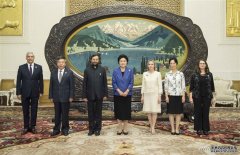Feature: Turkish students in summer break are breed like rac
by Burak Akinci
ANKARA, June 13 (Xinhua) -- At last, the summer comes. Some 17.5 million Turkish students began their nearly three-month break, but some of them will have to continue studying for next year in order to be successful in several exams that will determine their future.
"This exam system has negative effects on students. Children as well as their parents live in a constant struggle and pressures if they want a good school," said Secil Sezer, a 44-year-old mother of two living in a neighbourhood of Cankaya in capital Ankara.
Her son aged 17 passed a few days ago the undergraduate placement examination (LYS), one of the main exams that a student has to go from age 12 in order to pursue higher education before going to a college entrance exam organized by the Assessment, Selection and Placement Center (OSYM).
"The whole family got mobilized on the moral and material levels for our son to be accepted in a respectable university in a big city. I pray to God that this will happen, otherwise, we will be frustrated, especially my son, who worked hard and spent his time studying at home rather than socializing with his friends," said Sezer with an anxious grin on her face.
And this is not all, some Ivy league university also may want students to take a special talent exam in order to be accepted among the lucky few.
There are important exams that determine a student's future, from secondary school to high school and from high school to university. But you need to take a course outside schools, because the public schools fall short of the necessary curriculum to pass the exams. This means that families spend a lot of money for their children to take special courses or private lessons.
A recent report of the Organization for Economic Cooperation and Development (OECD) on student well-being shows that Turkish students were one of the unhappiest in the world. According to the report, Turkish students excelled in both high anxiety and low expectations among a list of 72 countries.
The survey found Turkish students had the worst life satisfaction, with more than 20 percent saying that they were not satisfied in life.
And this is explainable by the fact that once accepted by an university after a centralized exam, it might not meet students' career expectations. Thus, according to official statistics, most of the students are not pleased by their majors.
Also in recent years, this massive centralized exam institution has been hit by controversy about its results trustworthiness.
Last December, the results of the education test Program for International Student Assessment (PISA), which is conducted by the OECD, dropped from 44th to the 49th compared to the last test in 2012.
The OECD operates the triennial survey of 15-year-old students around the world as part of PISA. PISA assesses the extent to the students near the end of their compulsory education.
The assessment focuses on the core school subjects of science, reading and mathematics.
The number of Turkish 15-year-olds who scored below average on the triennial PISA test is three times more than the those in more successful countries, according to test results.
Some 31.2 percent of Turkish students underperformed in mathematics, sciences and reading, comparing to 10 percent in more successful countries.
Turkey scored 420 points on the math test to place it 49th out of 72 countries, and 52nd in science and 50th in reading. Four years ago, Turkey was 43rd in science and 41st in reading.
Mehmet Balik, the head of the educational workers' union, (Egitim-Is) said to Xinhua that in Turkey, "students are unhappy because they are submitted to a unnecessary rat race and the main objective of families is to have them accepted in a good high school and then to a renowned university."
"The problem is that the government thinks in quantity and not in quality which is at the base of a good education. This has to change immediately, otherwise our children will never attain international standards and will be below par," he argued.
"Because of this exam oriented system, children do not have time to play in streets and meet new friends. They have to stay in their classroom or at home to study under the watchful eye of their parents," added Balik.
The specialist pointed out that the systemic problems of the national education in Turkey, where regulations change frequently, can eventually be solved with a broader consensus inside the society and a firmer ground on pedagogy for all, filling the gap between rich and poor regions.
"Inequalities and insufficiency of the education system in Turkey and the effects of exam oriented system are the main problem of education in our country," said Balik, who is also a teacher.















